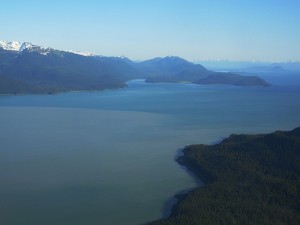 Army Corps of Engineers and the Supreme court has deemed Alaska’s Lower Slate Lake as a dump site for millions of tons of toxic tailings from gold mining. While these types of practices are presumably illegal under the US Clean Water Act, the courts failed to keep this ecosystem from being destroyed. A number of similar types of cases demonstrate that nature and the natural commons can be destroyed for private profit– especially in the name of providing jobs and fueling economic growth.
Army Corps of Engineers and the Supreme court has deemed Alaska’s Lower Slate Lake as a dump site for millions of tons of toxic tailings from gold mining. While these types of practices are presumably illegal under the US Clean Water Act, the courts failed to keep this ecosystem from being destroyed. A number of similar types of cases demonstrate that nature and the natural commons can be destroyed for private profit– especially in the name of providing jobs and fueling economic growth.
For example, mountain top removal which has buried thousands of miles of streams with coal seams is still legal under the Obama administration. The Clean Water Act is supposed to prevent our water systems from being denigrated from these types of activities, yet the Water Standard Quality Index allows site specific pollution levels for contaminants. Perhaps this is why according to the EPA, approximately half of the rivers, lakes, and bays under EPA oversight were not safe enough for fishing and swimming in 2007.
In the case of Alaska’s Slate Lake, Sen. Mark Begich (D-AK), said this project will provide an “improved fish habitat.” The permit which has been extended to Coer Alaska Inc., will allow the company to pollute the lake until 2014– effectively killing all aquatic life in the lake. The lawyers for the company have argued that this could be a good thing since the lake can be restocked after the project. This poses both a legal and moral question for humanity– Does nature have the right to exist on its own merits?
The planet’s ecosystems are in the mist of the sixth largest extinction event— this time caused by humans. In addition, our species consumes 1/3 of all productive land on the planet leaving the rest for the other ten plus million species we inhabit the planet with. Will economic growth and human consumption supersede the right for species and ecosystems to survive if its economically beneficial?
For the first time, the country of Ecuador has recognized the intrinsic rights oif nature. In September of 2008, the Ecaudor Constitutional Assembly voted to recognize the inalienable rights belonging to ecosystems in their new constitution. This changes the status of nature from being a function of property to a rights-bearing entity. Will this ground-breaking law have farther reaching impacts on international law? Hopefully sooner rather than later as climate change, resource depletion, and pollution accelerates its impacts on the planet.
